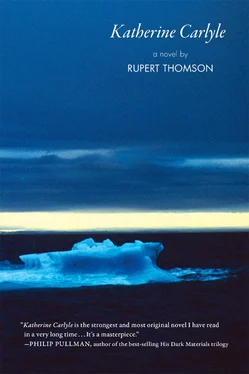I take my usual shortcut, behind the back of the school, then through the playground with its warped collapsing hut and its marooned blue rowboat, and up past the new canteen. The vodka simmers deep inside my body. I’m already looking forward to being home and lying in the dark with the radio on. The botanist’s words come back to me. We must be interesting . Smiling, I climb the short flight of steps that leads up to the front door of my building.
I’m standing at the foot of the stairs, by the fire extinguisher, feeling for my key, when somebody grabs me from behind and clamps a hand over my nose and mouth. Without looking, I know it’s the man in the green jacket. Bohdan. He must have been waiting in the shadows just inside the door. His palm is rough, like the heel of a foot. It smells of nicotine. He wraps his other hand round my middle, trapping my arms, and drags me away from the stairs. I kick backwards. Catch him on the shin. He twists my head so violently that colors explode before my eyes. White, then purple. I can’t cry out, though. I can hardly breathe. I think about biting his hand but it would be like sinking my teeth into cardboard or leather. It’s hard to believe that his hand and my face are made of the same thing.
He hauls me back outside, into the dark. I let myself go floppy as a doll, as if I’ve passed out or given up. My weight doesn’t seem to trouble him, though he’s breathing noisily, through his mouth. The reek of vodka hangs around him in a cloud. He’s drunk, as always. I have to use that to my advantage. He might be strong but he’s bound to be sloppy, careless, unsteady on his feet. I’m sure I’m faster than he is. More nimble. If I can just wrench free of him I don’t think he’ll be able to catch me. Where’s my door key, though? I no longer have it. I remember a chink and then a tinkle as it bounced off the fire extinguisher and landed on the floor. I see it in my mind’s eye, pewter-colored, lying on the concrete.
The sky tilts, its blackness sooty, dense. The moon is nowhere. It seems a different night to the one that hypnotized me earlier. The man drags me backwards across a stretch of wasteground. My hat has fallen off; cold air scalds my ears. Though I’ve been mapping the town for weeks, I can’t tell which way he’s going. Will anybody see us? Probably not. It’s too dark, too late. Their TVs will be turned up loud, their curtains drawn. Shouting won’t do any good. It’s the wind , they’ll say. It’s just the wind .
My heels bump and scrape over hard snow, and my neck aches from when he twisted it. I want to take a deep breath but his hand’s still clamped over my face. I glimpse a park bench, then a lamppost, then I seem to disappear into myself. Everything shrinks, and I turn inwards, crumple, drop away. I keep falling, but never land, and there’s a dragging, chain-mail sound, like waves on shingle. I can’t feel my body or the cold, and I’ve lost all sense of where I am.
I come to in a derelict room, the floor covered with sheets of paper, dust, and broken glass. A single beam of light shows me a doorway and part of a wall. At the far end of the room is an overturned piano, the rows of white hammers tightly packed as the gills on a fish. All manner of things are scattered about. A tin bowl, a boot, a dumbbell. A red book lies facedown, its spine split open. There’s nothing that isn’t incomplete or out of place, nothing that hasn’t been tampered with or damaged.
All of a sudden I’m laughing.
I have just remembered a conversation with my father. I was staying with a family in an idyllic Alpine village as part of an exchange program. I would have been sixteen at the time. During the first week my father called from Libya.
“How’s it going?” he asked.
“There have been violent clashes between the security forces and the protesters,” I told him, “but we’re hoping order will be restored quite soon.”
My father sighed. “Are you learning any French?”
I notice, almost incidentally, that I’m naked below the waist, except for my socks. My trousers and boots lie in a tangled heap nearby. The man stands over me, swaying slightly. There’s no cut on his forehead, and his hair is not receding. He’s younger than Bohdan, with a bulbous nose. I have never seen him before.
It’s sometime in the future, late spring or early summer. The sky is a high hard blue, the sawtooth peaks still capped and patched with snow. The fjord is blue too, smooth and polished as a glaze. The coastal plains and tundra blaze with Arctic bell heather, purple saxifrage, and mountain avens. I have never seen a landscape that has such a clear empty beauty. People often cry at the return of the light.
My father has arrived by ship. He always scoffs at the kinds of holidays that are advertised in the windows of travel agencies or the back of Sunday color supplements — Experience the Magic of the Midnight Sun ! — but as I watch him step out onto the deck I sense a change in him, a relaxation of his principles. Lydia appears. Her red hair, long and loose, streams sideways in the breeze. When it blows across his face, half blinding him, he laughs. She tilts her head and twists her hair into a rope. Her ring finger glints. Ah yes. I see. He may have lost a daughter but he has found a wife.
The cruise ship anchors in the fjord, and passengers are encouraged to go ashore in Zodiacs. The museum is worth a visit. They can see a polar bear’s heart preserved in alcohol, a chess set carved out of driftwood by an early settler, a range of elegant harpoons. They can stop at the hotel bar and drink hot tea or local beer or sweet champagne. There’s also a shop that sells Russian souvenirs. Though my father disapproves of groups and tours it’s unlikely he will pass up the chance to explore such a strange and desolate place. Is it sheer coincidence that has brought him here? Or is he still looking for me, still following leads, no matter how tenuous they might be?
As he stands at the guardrail, a little girl collides with him, then runs on up the deck. A woman calls after her to be careful. In her late forties, she has sleepy eyelids and an erect, almost military bearing. She apologizes for her daughter’s clumsiness, then asks my father if he ever read the story of what happened here.
“What story was that?” he asks.
“A girl was murdered.”
“Murdered?”
“Yes.” The woman surveys the town. Her drooping eyelids give her a complacent air. “It was in all the papers.”
“Was she a local girl?”
“That’s just it. She wasn’t from here at all.”
My father frowns. “I don’t remember it,” he says half to himself. “Perhaps I was away.”
“She was English,” the woman says. “Like us.”
A sudden sickly churning in his heart. “What was her name?” But he keeps his eyes on the town, with its rusting containers, its gantries, and its messy coal spills. He can’t bear to look at the woman for fear of what she might say next.
“Her name? I don’t remember.”
Lydia takes my father’s arm. “Are you all right, David?”
He doesn’t answer.
I turn my head to the right, away from where the piano is. A door opens into another room. On the faded green wall someone has transcribed a poem in black felt-tip, some lines tilting upwards, others sagging in the middle. I feel the poem might hold the key to everything, but it’s too far away to read, and anyway it’s written in a language I can’t understand.
“I know this room,” I murmur.
I’ve drawn this room. I’m in the old miners’ canteen, on the first floor.
The man has rolled me over, onto my stomach, my left cheek pressed into the dust and dirt. I’m facedown, gagged with a cloth that tastes of bleach and oil. My locket is lying a few feet away, just out of reach. The chain must have snapped during the struggle. The man unfastens his belt. Everything is taking a long time but there are gaps too. Breaks in the continuity.
Читать дальше












